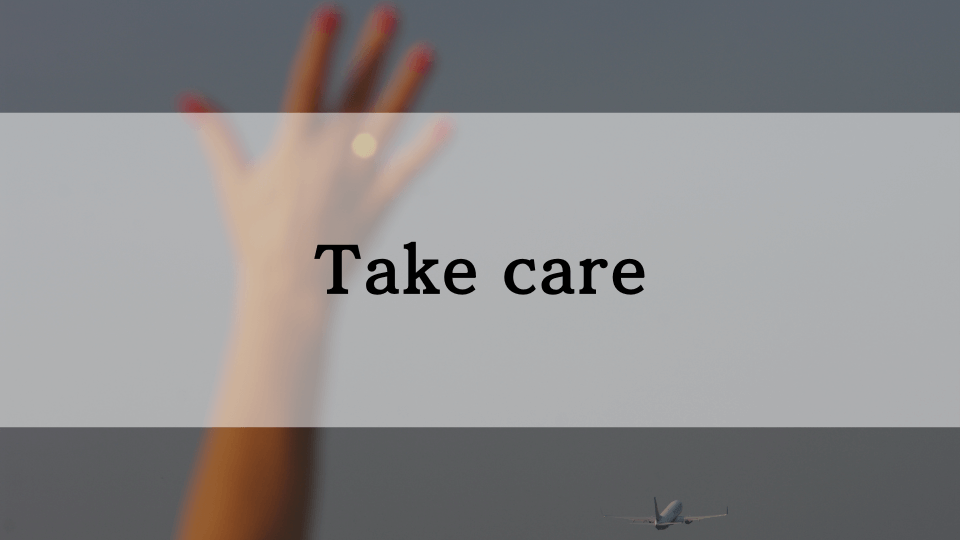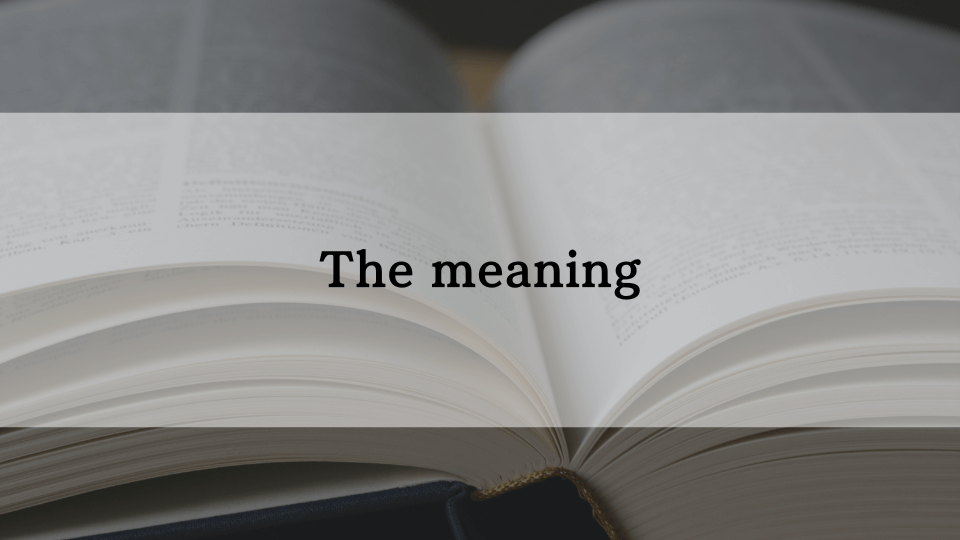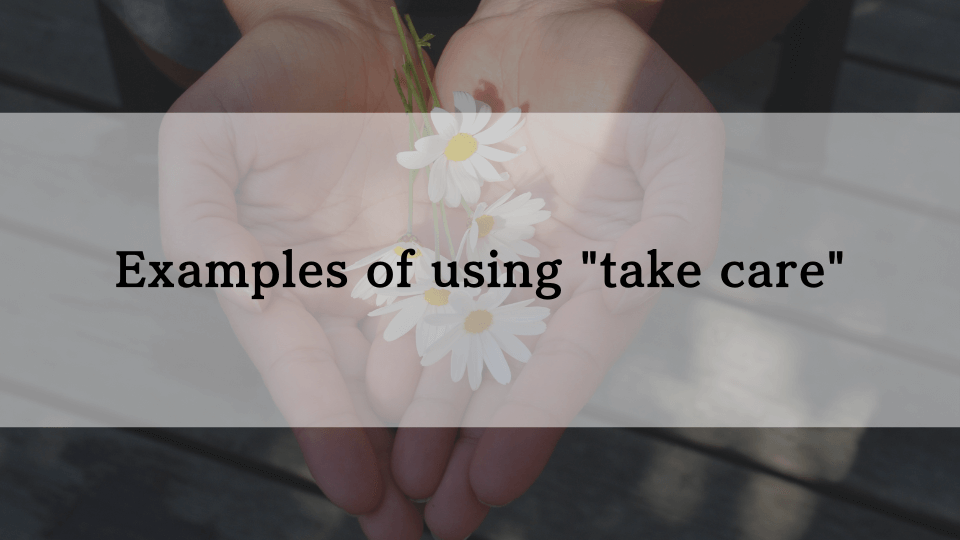【Bartek先生】
今日は「Take care」というイディオムについてお話ししたいと思います。
この表現は英語圏の人々によく使われますが、文字通りに受け取ると少し混乱するかもしれません。
このブログでは、「Take care」が会話でどのように使われるのか、状況によってニュアンスがどのように変わるのか見ていきましょう。
実践的な英語ならケンジントン英会話
ケンジントン英会話では、教科書には載っていない、生きた表現を身に付けられます。
福岡市内の教室やオンラインで、経験豊富でフレンドリーな講師と一緒に英語を学びませんか?
実践的な英語を学びたい方はケンジントン英会話の公式サイトをチェック!
「Take care」の意味
最も一般的な使い方は、人と会った後の別れ際に挨拶として使うことです。
「goodbye (さようなら)」や「see you (またね)」と同じです。
つまり、それが持つ唯一の意味は、単に誰かを思いやり、気をつけてほしいということだけです。
その状況では、それ以外の他の意味は込められておらず、単に、良い意図の丁寧な表現です。
ただ問題は、この「take care」という言葉について考えすぎると、分かりづらくなってしまうかもしれません。
「Merriam-Webster辞書」によると、「take care」は、
(i) 注意深くあること、慎重に行動すること
(ii) 何かをする、またはしないことに特に注意を払うこと
という意味があるとされています。
「ええと、では ”Take care” と言われたら、その人は私が自分に注意を払っていないと言いたいの??」
いいえ!少なくとも、「Take care」が穏やかで励ましのトーンで話された場合はそうではありません。
「では、辞書に書いてある意味では使われてないのですか?」
もちろん、それらの意味としても使われます。それは会話から推測できますが、通常は適切な文脈の中で出てきます。
「take care」は、「of」「in」「to」といった前置詞を伴うことがあります。
それらは少しまたは大きく異なる意味を持つかもしれません。
「Take care of something」は世話の対象を指します。
「Take care in doing something」(「in」が省略されることもあります)は、その活動中に注意するようにという警告です。
最後に、「Take care to do something」は、それを忘れないようにというリマインダーです。
「Take care」を使った例文
友達に安全に帰るように言いたい場合は、
Have a safe trip back home and take good care of yourself on your way there
(帰る時は安全に、気をつけて帰ってね。)
またはシンプルに
Take care
(気をつけてね)
と言うことができます。
ほとんどの場合、英語を話す人は上記の言葉を特に考えることなく習慣的に言います。
次に前置詞を使った「take care」の例を見てみましょう。
【take care of …】
Take care of your family.
(ご家族を大切になさってくださいね。)
Take care of that new jacket.
(その新しいジャケットを大事にしてくださいね。)
ときどき、「Take care of yourself first!」という言葉も聞くことがあるかもしれません。
これは、「最初に自分のことを心配して、それから他の人のことを心配して」という意味です。
【take care in …】
Take care in cutting the vegetables
(野菜を切る時は気をつけて)
または前置詞なしで
Take care cutting the vegetables
(野菜を切る時は気をつけて)
これは、野菜を切るときに注意してケガをしないようにしようという意味合いがあります。
【take care to …】
Take care to cut the vegetables
(野菜を切ることを忘れないように気をつけて)
まとめ
「Take care」は、会話の終わりに「goodbye (さようなら)」と言う時の私のいつもの言い方です。
特に深く考えることなく、他のあいさつよりも頻繁に使います。
「Have a good weekend, Bartek! (良い週末を、バルテク!)」
「Thanks! Take care! (ありがとう!またね!)」
は、金曜日に私がよく言う典型的な会話の終わり方です。
私は前置詞を伴う「take care」もかなり頻繁に使いますが、先ほどの説明の通り「take care」単体の時とはかなり異なる意味があります。
しかし誰かが「Take care」と言ったら、それはシンプルに相手はあなたのことを思いやっているのです!
実践的な英語ならケンジントン英会話
ケンジントン英会話では、教科書には載っていない、生きた表現を身に付けられます。
福岡市内の教室やオンラインで、経験豊富でフレンドリーな講師と一緒に英語を学びませんか?
実践的な英語を学びたい方はケンジントン英会話の公式サイトをチェック!
[英語原文]
Taking care of “Take care.”
Today, we’ll talk about an idiomatic phrase, “Take care.” It is used commonly by English speakers but might be a little confusing when taken too literally. We’ll look at how it is usually used in conversations and discuss if any nuances can change its meaning.
The meaning
In its most common use – at the end of a meeting – “take care” is simply a friendly salutation. A substitute for “goodbye” or “see you.” As such, the only meaning it carries is that of wishing someone well and telling them to be careful. In that situation, there is no implied meaning. Just a simple, polite expression of good intention.
You may ask then, “So, where’s the controversy?” Well, the first problem might be in overthinking. According to the Merriam-Webster dictionary, “take care” can mean (i) to be careful or watchful, to exercise caution or prudence, or (ii) to give particular attention to doing or not doing something. “Sooooo, did he mean that I don’t take care of myself???” No! At least not when the “Take care” was spoken in a mild, encouraging tone.
“But wait, what about those dictionary meanings?” Of course, those meanings can also be inferred from a conversation, but they usually would come within an appropriate context. The phrase “take care” would be then accompanied by prepositions such as “of,” “in,” or “to.” They may have slightly or starkly different meanings, though. “Take care of something” points at the object of care. “Take care in doing something” (sometimes with the “in” omitted) alerts one to be careful during the activity. Finally, “Take care to do something” is a reminder not to forget to do it.
Examples of using “take care”
Say a friend is leaving, and you want to wish them a safe travel home. You may say, “Have a safe trip back home and take good care of yourself on your way there,” or simply, “Take care.” In most instances, English speakers say that habitually, without even thinking.
Let’s look at the examples of using “take care” with prepositions.
“Take care of your family” or “Take care of that new jacket” seem pretty self-explanatory. Occasionally, you may hear someone saying, “Take care of yourself first!” meaning, “Worry about yourself first and only then about others.”
“Take care in cutting the vegetables” or, without the preposition, “Take care cutting the vegetables” would signal that we should be careful cutting the vegetables and not hurt ourselves.
“Take care to cut the vegetables” would remind us not to forget to cut the vegetables.
Personal Examples and Conclusion
“Take care” is my usual (if not default) way of saying “goodbye” at the end of a conversation. I say it without thinking much and more often than any other salutation. “Have a good weekend, Bartek!” “Thanks! Take care!” would be a classic end of a conversation I’d have on a Friday. I also use “take care” with prepositions fairly often, but as we could see, the prepositions give the phrase quite a different meaning than the plain “take care.”
So, no need to worry about implied meanings. If someone says, “Take care”, it’s simple! They wish you well!
~*~*~*~ \ Follow me / ~*~*~*~
Instagram : @kensington_eikaiwa
Twitter : @Kensington_Eng
Facebook : @kensingtoneikaiwa
YouTube : KENSINGTON英会話
~*~*~*~*~*~*~*~*~*~*~*~*~*
◆お問い合わせはこちら
ケンジントン英会話:お問い合わせフォーム


































